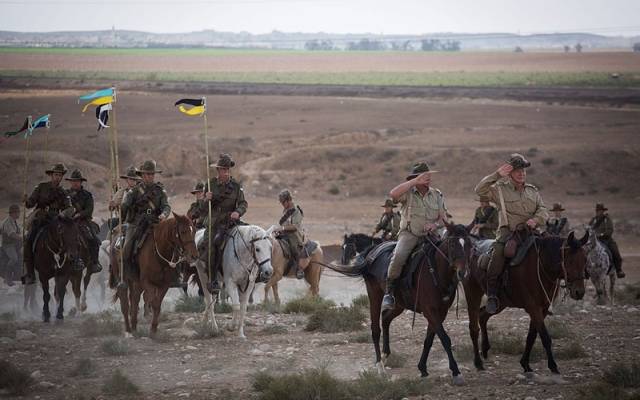Some 200 Australian riders reenacted WWI’s crucial battle for Beersheba, which decided the end of the war and reshaped the Middle East.
A century to the day after Australian horsemen broke through Ottoman defenses in a daring First World War victory, nearly 200 reenactors, including descendants of the soldiers who fought that day, participated on Tuesday in a memorial to those killed in a battle that helped turn the tide of the war and shape the modern Middle East.
Australian Prime Minister Malcolm Turnbull and New Zealand Governor-General Patsy Reddy accompanied 175 members of the Australian Light Horse Association marking the centenary of the Battle of Beersheba, paying tribute to the 171 British troops killed.
The battle was a crucial victory in the Mideast campaign that enabled the Allies to break the Turkish line and capture Jerusalem weeks later. The victorious campaign redrew the map of the Middle East.
In the fall of 1917, Allied forces with General Sir Edmund Allenby’s Egyptian Expeditionary Force advanced on Gaza as part of a campaign to knock the Ottoman Empire, Germany’s ally, out of the war. To outflank the Turkish troops entrenched around Gaza, a parched detachment made a desperate maneuver through the Negev Desert to capture the strategic biblical town of Beersheba, known both in antiquity and in modern times for its wells.
On October 31, 1917, Allied troops launched their assault, but by late in the day, the critical water sources remained in Turkish hands. In a desperate gambit, mounted infantrymen with the Australian and New Zealand Army Corps (ANZAC) drew their bayonets, charged the Turkish trenches cavalry-style, and stormed into the town.
Iconic Battle Demonstrates “Spirit of Australian People”
Had they been turned back, the entire campaign might have been lost.
For the Australians, the Battle of Beersheba is iconic of “the spirit of the Australian people” said Kelvin Crombie, a historian and one of the organizers of the 100th anniversary commemorations, “daring, bold and courageous.” Having suffered crushing defeats at Gallipoli and on the Western Front, it’s remembered as the young nation’s first real victory.
The Light Horse charge also proved decisive for the Zionist dream of a future Jewish state. Two days later, after word of the victory reached London, Britain’s foreign minister Lord Arthur Balfour issued a declaration calling for “the establishment in Palestine of a national home for the Jewish people.”
“More and more Australians are beginning to understand it wasn’t just a daring military charge, it really was something that had an effect on world history,” Crombie said.
By: AP
